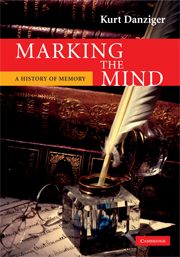5 - An experimental science of memory
Published online by Cambridge University Press: 05 June 2012
Summary
Is memory a scientific category?
Several of the late nineteenth-century developments described in the last chapter attest to a growing belief that the way to unlock the mysteries of human memory was to subject them to the procedures of medical and natural science. Although the scientific context for modern memory discourse was by no means homogeneous, and ‘science’ could certainly mean different things at different times and in different places, there was a shared commitment to systematic observation and public reporting of empirical data, to sharp distinctions between fact and theory and to naturalistic, preferably materialistic, explanation. Not all of these commitments were important for all examples of memory science, and there were significant differences in their concrete instantiation, but there was sufficient commonality to distinguish this new type of memory discourse from its predecessors. Beyond all their differences, those who personified the scientific approach to memory relied on special skills of investigation available only to accredited members of certain professions who shared the conviction that there was a natural knowledge about memory waiting to be discovered by the procedures of science.
Different versions of memory science looked for this knowledge in different places and by means of different practical procedures. One version, to be discussed in chapter 8, concentrated on the neuro-anatomical study of memory defects resulting from brain injury. Another version, already discussed in the last section of chapter 4, involved a psychopathologically orientated practice of exploring the disturbed relationship between past and present in individuals' personal lives.
- Type
- Chapter
- Information
- Marking the MindA History of Memory, pp. 124 - 155Publisher: Cambridge University PressPrint publication year: 2008

